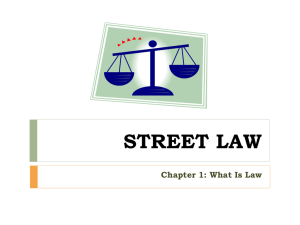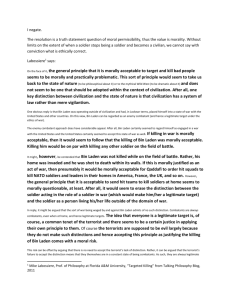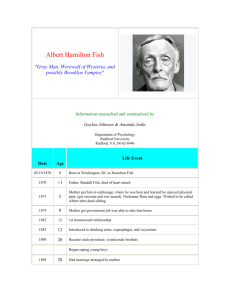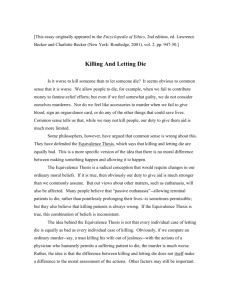CircuitDebater- Natural Law NC TOC
advertisement
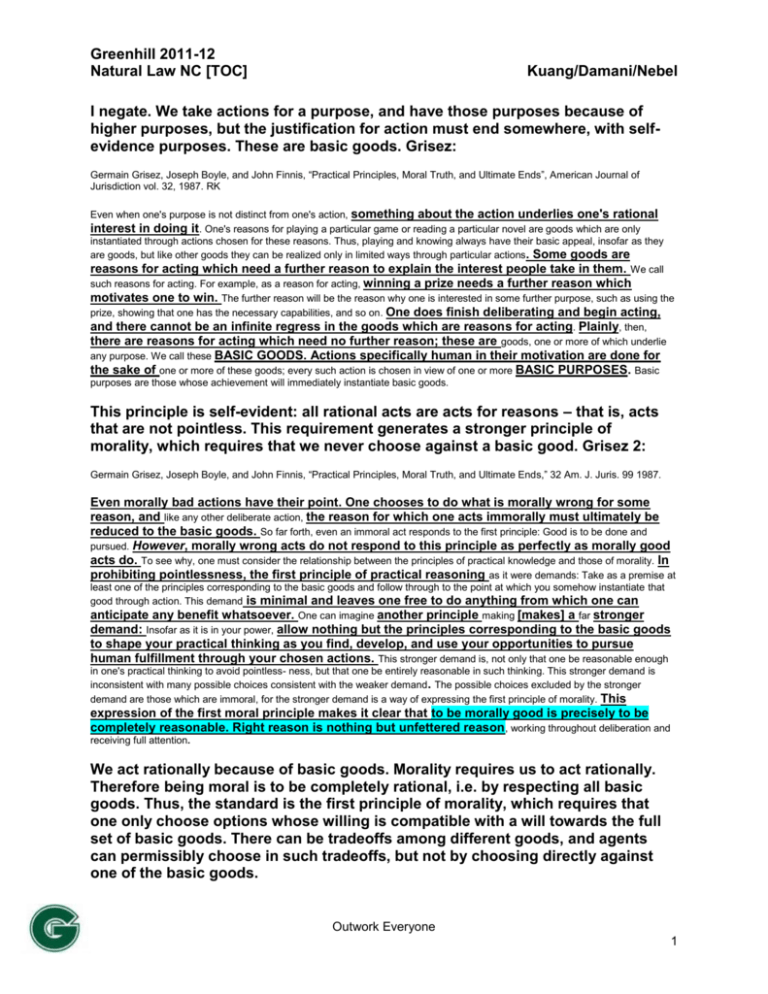
Greenhill 2011-12 Natural Law NC [TOC] Kuang/Damani/Nebel I negate. We take actions for a purpose, and have those purposes because of higher purposes, but the justification for action must end somewhere, with selfevidence purposes. These are basic goods. Grisez: Germain Grisez, Joseph Boyle, and John Finnis, “Practical Principles, Moral Truth, and Ultimate Ends”, American Journal of Jurisdiction vol. 32, 1987. RK Even when one's purpose is not distinct from one's action, something about the action underlies one's rational interest in doing it. One's reasons for playing a particular game or reading a particular novel are goods which are only instantiated through actions chosen for these reasons. Thus, playing and knowing always have their basic appeal, insofar as they are goods, but like other goods they can be realized only in limited ways through particular actions. Some goods are reasons for acting which need a further reason to explain the interest people take in them. We call such reasons for acting. For example, as a reason for acting, winning a prize needs a further reason which motivates one to win. The further reason will be the reason why one is interested in some further purpose, such as using the prize, showing that one has the necessary capabilities, and so on. One does finish deliberating and begin acting, and there cannot be an infinite regress in the goods which are reasons for acting. Plainly, then, there are reasons for acting which need no further reason; these are goods, one or more of which underlie any purpose. We call these BASIC GOODS. Actions specifically human in their motivation are done for the sake of one or more of these goods; every such action is chosen in view of one or more BASIC PURPOSES. Basic purposes are those whose achievement will immediately instantiate basic goods. This principle is self-evident: all rational acts are acts for reasons – that is, acts that are not pointless. This requirement generates a stronger principle of morality, which requires that we never choose against a basic good. Grisez 2: Germain Grisez, Joseph Boyle, and John Finnis, “Practical Principles, Moral Truth, and Ultimate Ends,” 32 Am. J. Juris. 99 1987. Even morally bad actions have their point. One chooses to do what is morally wrong for some reason, and like any other deliberate action, the reason for which one acts immorally must ultimately be reduced to the basic goods. So far forth, even an immoral act responds to the first principle: Good is to be done and pursued. However, morally wrong acts do not respond to this principle as perfectly as morally good acts do. To see why, one must consider the relationship between the principles of practical knowledge and those of morality. In prohibiting pointlessness, the first principle of practical reasoning as it were demands: Take as a premise at least one of the principles corresponding to the basic goods and follow through to the point at which you somehow instantiate that good through action. This demand is minimal and leaves one free to do anything from which one can anticipate any benefit whatsoever. One can imagine another principle making [makes] a far stronger demand: Insofar as it is in your power, allow nothing but the principles corresponding to the basic goods to shape your practical thinking as you find, develop, and use your opportunities to pursue human fulfillment through your chosen actions. This stronger demand is, not only that one be reasonable enough in one's practical thinking to avoid pointless- ness, but that one be entirely reasonable in such thinking. This stronger demand is inconsistent with many possible choices consistent with the weaker demand . The possible choices excluded by the stronger demand are those which are immoral, for the stronger demand is a way of expressing the first principle of morality. This expression of the first moral principle makes it clear that to be morally good is precisely to be completely reasonable. Right reason is nothing but unfettered reason , working throughout deliberation and receiving full attention. We act rationally because of basic goods. Morality requires us to act rationally. Therefore being moral is to be completely rational, i.e. by respecting all basic goods. Thus, the standard is the first principle of morality, which requires that one only choose options whose willing is compatible with a will towards the full set of basic goods. There can be tradeoffs among different goods, and agents can permissibly choose in such tradeoffs, but not by choosing directly against one of the basic goods. Outwork Everyone 1 Greenhill 2011-12 Natural Law NC [TOC] Kuang/Damani/Nebel I contend that a victim’s use of deliberate deadly force is a violation of the will towards basic human goods. First, deliberate killing requires the killer to take an attitude towards life that does not respect human fulfillment. Grisez 3: Grisez, Germain. [Former Professor of Christian Ethics at Mount Saint Mary’s University in Emmitsburg, Maryland], “Toward A Consistent Natural Law Ethics of Killing.” AmJJruis 15 [1970]. In this nonutilitarian moral outlook, whether or not another person's death is admitted within the scope of our intention is extremely important. A difference of intention can relate identical behavior in quite different ways to our moral attitude, and to the self being created through our moral attitude. If one intends to kill another, he accepts the identity of killer as an aspect of his moral self. If he is to be a killer through his own self-determination, he must regard himself in any situation as the lord of life and of death. The good of life must be rated as a measurable value, not as an immeasurable dignity. Others' natural attitudes toward their own lives must be regarded as an irrational fact, not as a starting point for reasonable community. However, if one intends not the death of another but only the safety of his own life, then one need not identify himself as a killer. One's attitude toward human life itself and toward everything related to it can remain that of a person unwilling to take human life. But, human life is a basic good. Grisez 4: Germain Grisez, [Former Professor of Christian Ethics at Mount Saint Mary’s University in Emmitsburg, Maryland], The Way of the Lord Jesus Vol. 1, RK Rational reflection supports the truth faith teaches. First, the instrumental view of the good of human life implies dualism. As already explained, intrinsic human goods are not possessions of persons, but the fulfillment of their being. On the instrumental view of life, life is not part of the intrinsic good of persons. However, life certainly is not separable from the living body, as if it were a mere possession. Thus, on the instrumental view of the good of life, the living body will be one thing and the fulfilled person something else. Thus the instrumental view of the good of human life implies dualism. Second, dualism is indefensible (see S.t., 1, q. 75, a. 4; q. 76, a. 1). Life is not merely one process among others, a process which can be distinguished from breathing, feeling, choosing, talking, and so on. The life of a person is indistinguishable from the person’s very reality. Life must pervade every part and activity of a person, or something of the person would be unreal. Moreover, one’s fulfillment is the completion of one’s given self. If the personal goods which constitute fulfillment were other than one’s given self, one could not fulfill oneself by acting. Finally, according to New Oxford American Dictionary, deliberate acts are “done consciously and intentionally,” so the aff’s version of self-defense is impermissible because the killer intends the attacker’s death and not just selfpreservation. Justice Robert Hunter furthers: Justice Robert Hunter, [Judge of Court of Appeals of North Carolina], State vs Stitt, http://caselaw.findlaw.com/nc-court-ofappeals/1503763.html. FD "First-degree murder is the unlawful killing of another human being with malice and with premeditation and deliberation. "A killing is premeditated if the defendant formed the specific intent to kill the victim some period of time, however short, before the actual killing. "A killing is deliberate if the defendant acted in a cool state of blood, in furtherance of a fixed design for revenge or to accomplish an unlawful purpose and not under the influence of a violent passion, suddenly aroused by lawful or just cause or legal provocation . "Premeditation and deliberation are usually proven by circumstantial evidence because they are mental processes that are not readily susceptible to proof by direct evidence." However, even if he proves that it is necessary to kill in self-defense, that is not sufficient to meet my standard. The killer’s ultimate end should still be only selfdefense and not the death of the attacker. McMahan: Jeff McMahan, [Professor of Philosophy at Rutgers], “Revising the Doctrine of Double Effect”, Journal of Applied Philosophy, Vol.11, No. 2, 1994. RK One problem with these responses is that they appear to exclude some applications of the DDE that its proponents have wished to defend. For example, in a passage that many have cited as the origin of the DDE, Thomas Aquinas argues that, while it is wrong for one person to intend to kill another even in self-defence, killing in self-defence may still be permissible Outwork Everyone 2 Greenhill 2011-12 Natural Law NC [TOC] Kuang/Damani/Nebel provided that the lethal act of defence is carried out with the intention only to preserve one’s own life. Aquinas thus assumes that it is possible for one to foresee with certainty that one’s act will kill one’s assailant without intending the killing as a means of self-defence [4]. Various recent defenders of the DDE have accepted a view quite similar to Aquinas’s. To illustrate their view, consider: Self-Defence I : One’s only defence against an unjust and potentially lethal attack is to shoot the attacker at close range with a flame-thrower. The followers of Aquinas would accept that, in Self-Defence 1, it is possible to fire the flame-thrower intending only to incapacitate and not to kill the attacker, while foreseeing that one’s action would in fact kill him in the process of incapacitating him. The killing, or the death of the attacker, could, according to these theorists, be an unintended (though of course not accidental) side-effect [5].This, I believe, is quite plausible. The death of the attacker can only be either an accident or a foreseen consequence, but never the initial purpose of the deadly force. Outwork Everyone 3
